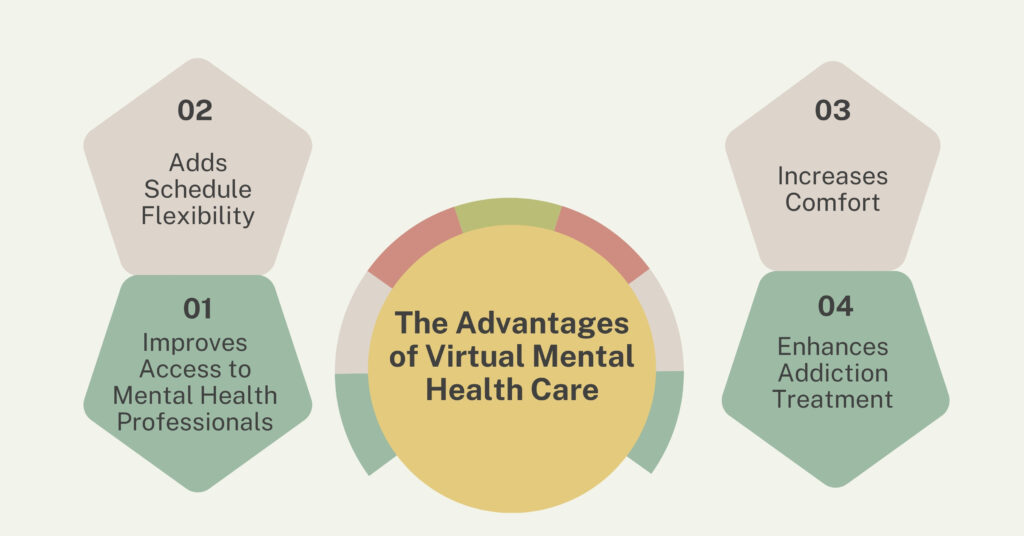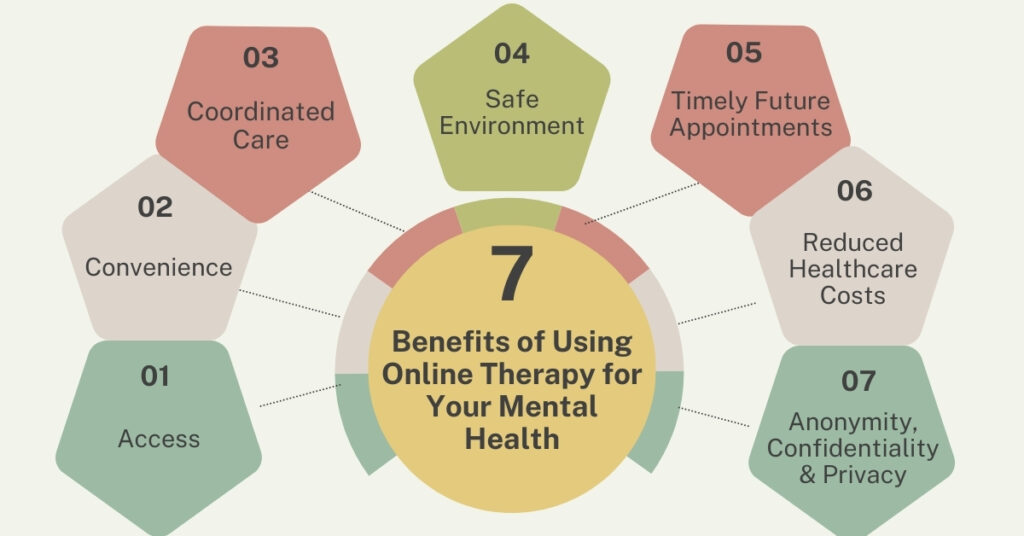Learn about Virtual Mental Health. Discover the transformative world of virtual mental health, offering accessibility, personalized support, and innovative solutions for mental well-being. Discover the top 7 benefits of using online therapy for mental health.
Introduction
Virtual mental health also referred to as telepsychiatry or teletherapy, entails providing mental health services and support through digital media. Such media encompass video calls, text messaging, mobile apps, and web-based platforms. The purpose is to increase the ease with which individuals can access therapeutic services even if they have difficulties hindering them from accessing the usual therapist-receiver therapy methods.
Virtual Mental Health
Virtual mental health is the delivery of psychological care using online methods. This includes tele-treatment, e-counseling, and mental health applications. Video calls, chats, or emails may be used to provide expert advice to persons from home. Owing to it, mental health services are now reachable, particularly by people in rural regions, or who are busy all the time.
Digital self-care tools are also part of online mental health such as mood trackers and guided meditation. It overcomes hurdles such as stigma travel costs and provider availability by using technology. Virtual mental health is changing mental wellness processes by giving people alternatives that are adjustable and can be easily accessed by anyone in need of assistance
The Advantages of Virtual Mental Health Care

1. Improves Access to Mental Health Professionals
Virtual mental health care provision has transformed access to mental health services. Historically, many people came across considerable obstacles when trying to receive mental health care such as being restricted by geographical location, having no services within reach, or feeling shy about going to hospitals for mental problems. These virtual platforms break down these barriers by linking patients up with qualified practitioners irrespective of where they may be found physically. The spread of democracy in terms of ability suggests that individuals from distant or underserved regions can obtain similar health situations just like those in towns. On top of that, virtual mental healthcare services have a wider choice of susceptibles, thus enabling patients who need cognitive-behavioral therapy whether it be support on post-traumatic stress disorder or advice on issues of depression and nervousness, to locate the most fitting ones.
2. Adds Schedule Flexibility
One of the most compelling benefits of virtual mental health treatment is the unbeatable flexibility it offers. In the modern fast-track life, it can be difficult to get time for appointments, especially for individuals juggling between work, family, and other activities. Virtual mental health platforms allow for individualized scheduling of sessions for people’s lifestyles including evenings as well as weekends which comes with flexibility.
Patients can access therapy more easily because commuting and waiting for appointments is less stressful, thereby permitting them to attend regular sessions. Moreover, conducting consultations from private spaces such as homes ensures that people are more at ease which in turn fosters their continuous involvement in mental health care.
3. Increases Comfort
A critical point in the cure of mental health problems lies in the need for comfortable and isolationist surroundings. Finding oneself inside the office of a psychologist often causes fear and nervousness in many people. This aspect of virtual mental healthcare takes away such worries by allowing the patient to receive treatment right at his/her place of stay (house). In such a surrounding the therapy process will be faster and more efficient as the person will have no problem discussing his/her feelings.
In addition, the privacy offered by virtual forums may arouse patients who would shy away from asking for assistance because of stigma or shame. This leads to a therapeutic process that is more personal to the person’s comfort zone and requirements thereby being effective.
4. Enhances Addiction Treatment
The technology is especially useful in the case of drug treatment. Sometimes, clients who are addicted to drugs need to be under the care of a therapist or psychiatrist regularly. It ensures ongoing interaction when needed because websites are there so that you can make consultations at any time with counselors and members anytime through them. For instance, when in a fix or feeling pulled towards your old habits, such conveniences go a long way to help guard against future use.
Furthermore, various therapeutic modalities can be employed in online addiction recovery programs including individual counseling, group therapy, and educational resources, fostering a comprehensive support system for addicts. This is because; it will ensure that support is continuous and holistic for them from anywhere and that it is up to their recovery journey.
7 Benefits of Using Online Therapy for Your Mental Health

1. Access
Online therapy substantially benefits mental health service availability. It can be difficult for many to find a local mental health professional for residents of far-flung or underserved areas.
Online therapies connect sufferers with competent custom transition irrespective of place. It provides wider access hence all individuals irrespective of their geographical location can receive mental health care.
2. Convenience
One of the biggest benefits of online therapy is the unequaled convenience it offers. Many times, regular face-to-face therapy necessitates taking days off work, finding someone to look after the children as well as traveling long distances for appointments. Patients do not have to show up at a therapist’s office anymore since online therapy enables them to have sessions while sitting at their homes or from any other place where there is internet coverage.
Its flexibility facilitates integration into busy schedules, which in turn fosters regular participation and improves psychological health results.
3. Coordinated Care
Online therapy platforms usually serve as an excellent opportunity for combined care services that could improve the whole process of therapy. Some of them offer instruments that help monitor progress or share data among medical personnel, while others provide necessary material like courses or books on self-medication. So, this distribution method guarantees that the treatment strategies have one goal, hence better outcomes semiclassed. It also enhances coordination among different healthcare providers which is important in handling complicated mental health conditions.
4. Safe Environment
Boosting the curing process is largely accrued to an old environment that is secure and safe. For individuals for whom going to the office of a counselor is fearful or raises anxiety episodes, online therapy comes in handy. When they need support and immediate intervention, patients can engage therapists while in their homes or anywhere else with an internet connection.
This convenience is so significant in that it helps individuals to become relaxed and open during sessions, thus the result is that they carry out their therapy in a better and very efficient manner.
5. Timely Future Appointments
Another major benefit of online therapy is the fact that scheduling is flexible. Evening and weekend appointments are common on several online platforms. This enables patients to reduce the risk of missed appointments by booking sessions when it is convenient for them.
The quick ability to schedule and request follow-up appointments guarantees timely and continuous care for patients, a thing that is indispensable when treating mentally ill patients.
6. Reduced Healthcare Costs
Costs are typically lower in online therapy than they are in traditional face-to-face therapy. By not having to worry about office rent and related expenditures, practitioners are usually able to bill at lower costs per session. Hence, this may lead to improved profit margins in cases like these due to canceled appointments and high travel costs combined with effective treatments in a busy world.
Many people find that this cost reduction increases the affordability and accessibility of mental health care and thus urges them to seek assistance with no financial burden when in need.
7. Anonymity, Confidentiality & Privacy
Anonymity, confidentiality, and privacy are critical components of effective mental health care. Online therapy platforms are designed to maintain high standards of privacy and security, ensuring that patients feel safe and confident in their treatment.
For those concerned about the stigma associated with seeking mental health support, the anonymity offered by online therapy can be particularly reassuring. Patients can access therapy discreetly from their own spaces, knowing that their sessions are confidential and secure.
FAQs
Can I use my insurance for virtual mental health services?
Virtual mental health services are now covered by most insurance plans but the coverage greatly varies depending on the insurance policy. Therefore, the best option is to first consult your insurance provider regarding what is catered for within your plan.
Is virtual mental health effective?
Yes, virtual mental health services work for many people and research has shown that for many mental health conditions such as anxiety, depression, stress-related conditions, and others, online therapy works as effectively as in-person sessions.
How does virtual mental health work?
Most times, virtual mental health care is administered using secure sites found on the internet. It means that you can make appointments with people trained in psychology; engage in video or chat sessions involving the same issue or even just random counseling; and use applications and advice on how to take care of oneself for these purposes without any external help.
Can I use virtual mental health services alongside traditional therapy?
Yes, extra convenience, flexibility, and ongoing support are some of the reasons why one would prefer combining traditional therapy with virtual mental health services. However, it is crucial to have this conversation with your mental health professional to promote better coordination of care.
Conclusion
Virtual mental health services have revolutionized the way individuals access mental health care. By leveraging technology, these services offer greater accessibility, convenience, and privacy, making it easier for people to seek help from the comfort of their own homes. The flexibility of virtual mental health platforms allows for a wider reach, helping to address the needs of diverse populations, including those in remote or underserved areas. As the landscape of mental health care continues to evolve, virtual services are poised to play an increasingly vital role in providing timely and effective support, ultimately contributing to the overall well-being of individuals and communities.
Author

Avidon Health is transforming how organizations promote healthier lifestyles through behavior change science and technology-driven coaching. Our mission is to empower individuals to achieve better health outcomes while driving measurable business success for our clients.With over 20 years of expertise in health coaching and cognitive behavioral training, we’ve built a platform that delivers personalized, 1-to-1 well-being experiences at scale.Today, organizations use Avidon to reimagine engagement, enhance health, and create lasting behavior change—making wellness more accessible, impactful, and results-driven.
